|
|
|
Sort Order |
|
|
|
Items / Page
|
|
|
|
|
|
|
| Srl | Item |
| 1 |
ID:
173395
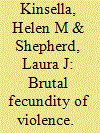

|
|
|
|
|
| Summary/Abstract |
This article highlights Marysia Zalewski's scholarship as reflective and generative of the multifarious sources and contributions of feminist IR and its ‘scavenger methodologies’, which seek to centre subjects, processes, and practices historically excluded, ignored, and minimised. The productive depth of her scholarship is evident in the uniqueness of each article in this collection, all of which distinctly document the uses to which Zalewski's writings can be uniquely put. Each of the articles performs a ‘turning operation’ of sorts on the elementals of feminist IR (gender/women/power/difference) and brings further elaborations of masculinities, sexualities, silences as well as screams, that shift and change what is taken to be feminist research/method – at each point disordering our sensibilities and our assumptions as to what we do when we do feminist work.
|
|
|
|
|
|
|
|
|
|
|
|
|
|
|
|
| 2 |
ID:
173398


|
|
|
|
|
| Summary/Abstract |
Forestalling sureties about what constitutes violence and feminism and the relationships between violence and feminism have been significant themes in the work of feminist International Relations theorist Marysia Zalewski. I follow how Zalewski, through her work and work with others including myself, interrupts well-trodden ‘trails’ of violence and feminism to open up thinking about both. I consider how her provocative work on violence and particularly feminist violence prefigures and advances cutting-edge critical thought on violence as represented in the ‘Histories of Violence’ project. What I call her ‘palimpsestic’ or multilayered and intertextual approach to violence reveals it as not only destructive, but also productive in terms of breaking with deadening conventions. I also consider her conceptualisation of feminist violence as both epistemic and militant over time in relation to some contemporary feminist insurgencies, the kinds of insurgencies that serve as her muses for breaking out of forms of ‘secured’ feminism and opening space for unbounded feminist thought. Consistent with her insistence that theory (and writing) should provide uncomfortable openings, not comforting foreclosures, I end not with a conclusion about her work, but rather echo her call to resist the kind of ‘knowing’ that suffocates critical thinking and (re)generative feminist thought.
|
|
|
|
|
|
|
|
|
|
|
|
|
|
|
|
| 3 |
ID:
173396
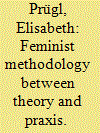

|
|
|
|
|
| Summary/Abstract |
The article revisits the problematic relationship between feminist theory and praxis through the writings of Marysia Zalewski, one of the foremost feminist theorists of IR. Zalewski has dealt with this relationship through her work on methodology. In three sections, the article explores: (a) her engagement with standpoint theory through her interventions in feminist IR debates with ‘the mainstream’; (b) her adoption of feminist postmodernism, embracing a deconstructive posture and in particular the notion of ‘hauntings’ as a methodological device; and (c) the development of a distinctive methodological attitude that seeks to involve, rather than explain or instruct. Crucially, for Zalewski, theory and praxis/politics cannot be separated methodologically: languages of mastery and an attitude of ‘doing something’ are of one cloth. The paper ends with a reflection about how L. H. M. Ling's method of ‘chatting’ could be enacted in engagements that cross the social fields of academia and policy.
|
|
|
|
|
|
|
|
|
|
|
|
|
|
|
|
| 4 |
ID:
173403
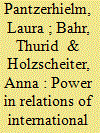

|
|
|
|
|
| Summary/Abstract |
In recent years, scholarship on international organisations (IO) has devoted increasing attention to the relations in which IOs are embedded. In this article, we argue that the rationalist-institutionalist core of this scholarship has been marked by agentic, repressive understandings of power and we propose an alternative approach to power as productive in and of relations among IOs. To study productive power in IO relations, we develop a theoretical framework centred on the concept of ‘metagovernance norms’ as perceptions about the proper ‘governance of governance’ that are shared among IOs in a governance field. Drawing on discourse theory, we contend that metagovernance norms unfold productive power effects, as dominant notions of how to govern well and effectively (i) fix meanings, excluding alternative understandings and (ii) are inscribed into practices and institutions, hence reshaping inter-organisational relations over time. To illustrate our framework, we trace metagovernance norms in discourses among health IOs since the 1990s. We find a historical transformation from beliefs in the virtues of partnerships, pluralisation, and innovation, towards discursive articulations that emphasise harmonisation, order, and alignment. Moreover, we expose the productive power of metagovernance norms by showing how they were enacted through practices and institutions in the global health field.
|
|
|
|
|
|
|
|
|
|
|
|
|
|
|
|
| 5 |
ID:
173399


|
|
|
|
|
| Summary/Abstract |
Marysia Zalewski's Feminist International Relations: Exquisite Corpse on feminism and global politics directly addresses matters of style, that is, questions of language and representation that foreground the invisible yet so palpable aspect of how meanings circulate. This article puts Zalewski's work in conversation with Trinh Minh-ha's D-Passage: The Digital Way and Lynda Barry's What It Is that similarly push the limits of how we craft feminist arguments. These feminists show how styles of writing and thinking, and how ideas gain shape to circulate matter in academic sites of knowledge as much as in art and culture. Building on these works, I put forward the thesis: to theorise is to feel out boundaries and question the questions we encounter that perennially relegate women as taint and malaise. I further explore this thesis by highlighting the visual dimensions of writing and thinking, in particular, what drawing, and drawing lines that shape ideas do. I focus on caricatures from the currently evolving North Korean nuclear crisis to loosen up the ways we go about thinking about war and politics wherein thinking is recognised not so much as a craft to be perfected but a democratic form of being in the world.
|
|
|
|
|
|
|
|
|
|
|
|
|
|
|
|
| 6 |
ID:
173400


|
|
|
|
|
| Summary/Abstract |
Cristina Masters (CM): The articles in this forum speak to how influential and inspiring your work is for scholars in the discipline of International Relations (IR), not least feminist scholars. Particularly, I think, for encouraging us to (re)think and (re)work with deeply familiar ‘things’ in deeply unusual – yet troublingly fecund – ways. Blood, for example, comes up quite frequently in your writing on methodology, even though it appears, as you say, an ‘unlikely candidate for methodological use’. What is so promising about blood for making sense of global politics?
|
|
|
|
|
|
|
|
|
|
|
|
|
|
|
|
| 7 |
ID:
173397
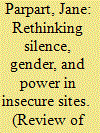

|
|
|
|
|
| Summary/Abstract |
My current interest in silence, gender, and power owes much to discussions with Marysia Zalewski over the years. Much of my work has focused on masculinity, gender relations, and gender hierarchies with a focus on security and development in conflict zones. More recently, I have begun to explore silence not as a sign of disempowerment, but as a powerful force that can be used in many ways. This approach enables a more multi-levelled understanding of silence and voice and their many interactions. It has much to tell the Global North, where we prize voice and often underestimate the power of silence.
|
|
|
|
|
|
|
|
|
|
|
|
|
|
|
|
| 8 |
ID:
173401


|
|
|
|
|
| Summary/Abstract |
Feminist International Relations (IR) theory is haunted by a radical feminist ghost. From Enloe's suggestion that the personal is both political and international, often seen as the foundation of feminist IR, feminist IR scholarship has been built on the intellectual contributions of a body of theory it has long left for dead. Though Enloe's sentiment directly references the Hanisch's radical feminist rallying call, there is little direct engagement with the radical feminist thinkers who popularised the sentiment in IR. Rather, since its inception, the field has been built on radical feminist thought it has left for dead. This has left feminist IR troubled by its radical feminist roots and the conceptual baggage that feminist IR has unreflectively carried from second-wave feminism into its contemporary scholarship. By returning to the roots of radical feminism we believe IR can gain valuable insights regarding the system of sex-class oppression, the central role of heterosexuality in maintaining this system, and the feminist case for revolutionary political action in order to dismantle it.
|
|
|
|
|
|
|
|
|
|
|
|
|
|
|
|
| 9 |
ID:
173402
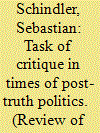

|
|
|
|
|
| Summary/Abstract |
Post-truth politics poses a specific problem for critical theories. The problem is that the relativisation of facts – the claim that knowledge is merely a product of power, history, and perspective – is a core aspect of present-day ideological thinking. Critical theories have been unable to respond to this challenge, because their critique has been directed against the opposite claim, namely the naturalisation of facts. While acknowledging this problem, this article argues that post-truth discourse actually combines relativisation and naturalisation. It does not simply relativise truth, but also naturalises the belief in specific ‘facts’ – notably the belief that ‘conspiracies are behind it all’. Once we recognise the twin character of post-truth, we must reject the view of Bruno Latour and others who have made critique responsible for the crisis. Instead, it then becomes apparent that there are deep and disconcerting similarities between post-truth politics and the totalitarian and authoritarian ideologies of the twentieth century. The task of critique is to confront and counter this resurgent ideology, thereby providing direction and orientation in the struggle for emancipation.
|
|
|
|
|
|
|
|
|
|
|
|
|
|
|
|
|
|
|
|
|